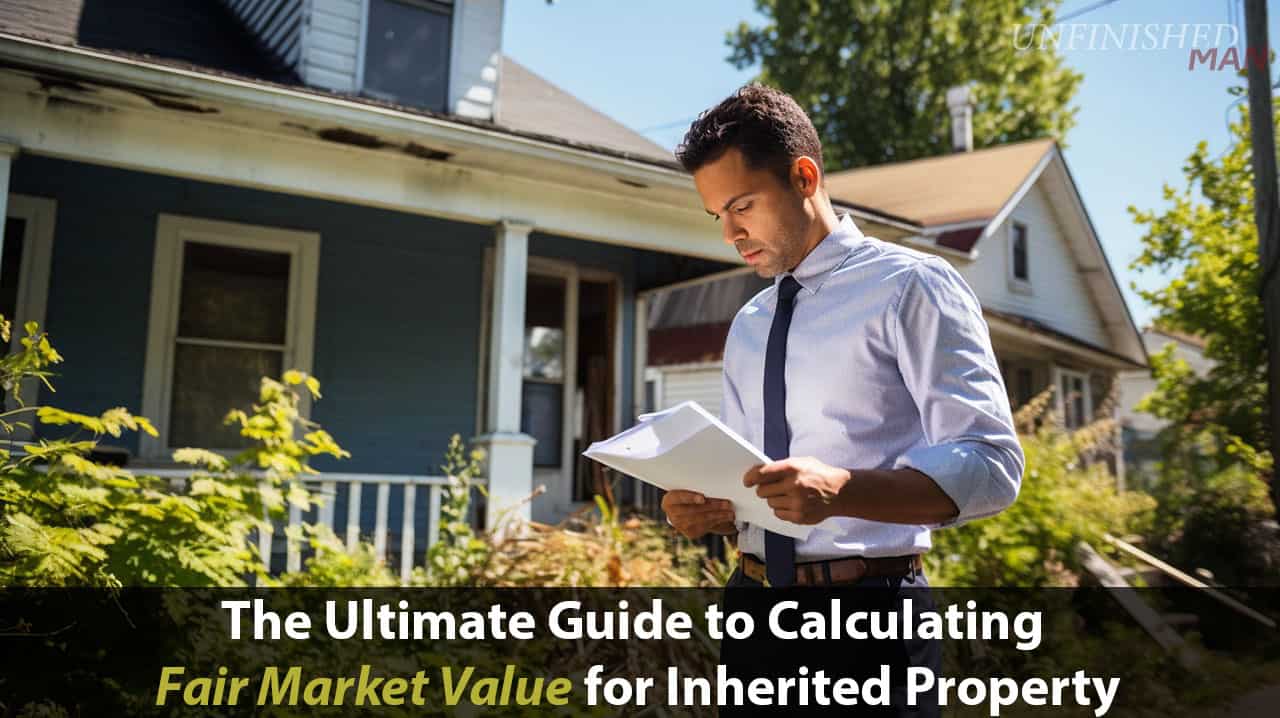Inheriting property can seem like a godsend, but how do you know what it’s really worth? You’re not alone in this dilemma; as an SEO professional and copywriter dealing with real estate, I’ve encountered this question quite frequently.
Unraveling the tasks involved in determining the fair market value of inherited property is far from straightforward – that’s where I come in. Let’s embark on a journey to discover valuable insights on understanding appraisals, tax assessments, professionals to consult, and much more.
Trust me; it’ll be enlightening!
Key Takeaways
Understanding the fair market value of inherited property is crucial for tax evaluations and making informed decisions.
Hiring licensed professionals like residential appraisers can provide accurate valuations based on home valuation methods and local market insights.
Tax assessment records can serve as a starting point, but they may not reflect the exact current value of the property. Consulting with local realtors or hiring a real estate appraiser ensures unbiased and accurate assessments.
Table of Contents
Understanding Fair Market Value of Inherited Property

The concept of fair market value plays a pivotal role in handling inherited property. Essentially, the term refers to the price that a property would fetch if sold on the open market between willing and knowledgeable buyers and sellers.
In terms of inherited real estate, knowing this figure is critical for both tax evaluations and planning your next steps, whether you decide to keep or sell.
As luck would have it, determining the fair market value of inherited property isn’t guesswork – there are procedures in place guided by laws and regulations set forth by tax authorities such as IRS (Internal Revenue Service).
Crucially, it’s the decedent’s date of death that serves as a crosshair for valuation. You see, taxes on sale are determined using this cost basis along with its current estimated worth.
Having said that, getting an accurate estimation requires more than just casual browsing through online real estate calculators or scanning county clerk’s office records. While these may provide rough estimates, hiring licensed professionals like residential appraisers comes highly recommended due to their expert knowledge of home valuation methods, including comparable properties analysis and detailed onsite inspections paired with local market insights.
Moreover, depending on the complexity of assets involved which could range from commercial properties to art collections or even family businesses – consultation with certified public accountants or legal counsel can ensure thorough accounting while providing much-needed bereavement support during times when emotional decisions can lead to financial missteps.
Yes, gentlemen! The reality is settling estates often involves navigating complex tax implications alongside dealing with personal loss but understanding what exactly constitutes fair market value gives you solid footing toward making informed choices regarding your inheritance.
Essential Steps in Determining the Value of Inherited Property

To determine the value of inherited property, there are essential steps you should take, including obtaining an appraisal, evaluating the property’s worth, consulting local realtors, and hiring a real estate appraiser.
Obtaining an Appraisal
Securing an appraisal is a pivotal step in understanding the fair market value of your inherited property. In this process, you hire a licensed real estate appraiser who carries out an extensive evaluation of your property, considering its structural condition, location, size, and comparable properties in the neighborhood.
It’s recommended to choose a residential or commercial appraisal depending on the nature of your asset.
A comprehensive appraisal report not just informs about the worth of your property but also gives insights into potential issues that might affect its value. The cost basis, which stands for how much the deceased owner paid for the home originally plus any major improvements made during their lifetime, forms part of this assessment too.
A professional appraiser can provide accurate data that benefits everyone involved in joint inheritance decisions and aids in settling potential disputes among heirs while resisting creditors’ claims or unpaid debts.
Evaluating the Property’s Worth
Delving into the worth of your inherited property demands a discerning eye and thorough research. By focusing on comparable properties in your region, preferably similar homes sold within the last six months, you get an understanding of what buyers are paying for properties like yours.
You can use online real estate value calculators or consult with local realtors for estimates; they’ll take into account factors such as location, square footage, condition of the property, and market trends.
However, bear in mind these figures represent estimates only. For an accurate assessment that holds up legally and financially (especially concerning potential capital gains tax), hiring a certified residential appraiser is recommended.
This professional will deliver a detailed valuation report based on solid examination and market analysis—valuable input for heirs during estate settlement discussions or if contemplating selling the property down the line.
Using Tax Assessment Records
To determine the fair market value of inherited property, one useful resource to consider is tax assessment records. These records, maintained by local tax authorities, provide an estimated value for properties in a specific area.
While they may not reflect the exact current value of the inherited property, they can give you a starting point to work with. By comparing similar properties in the same neighborhood and taking into account any recent changes or renovations made to the inherited property, you can refine your estimate further.
It’s important to note that tax assessment records are not always accurate, as they are often based on outdated information or assessed values for taxation purposes rather than true market value.
Consulting Local Realtors
One of the essential steps in determining the fair market value of inherited property is to consult local realtors. Local real estate agents have a deep understanding of the market and can provide valuable insights into the property’s worth.
They have access to comparable properties that have recently sold or are currently on the market, allowing them to make accurate estimates based on current market trends. Realtors can also consider factors such as location, condition, and amenities when assessing the value of inherited property.
Their expertise can help you make informed decisions about selling or keeping the property and ensure that you receive a fair valuation from an industry professional.
Hiring a Real Estate Appraiser
One crucial step in determining the fair market value of inherited property is hiring a real estate appraiser. An appraiser is a licensed professional who specializes in evaluating properties and providing objective valuations.
They use their expertise to assess various factors, such as the property’s condition, location, comparable sales in the area, and any unique features it may have.
By hiring a real estate appraiser, you can ensure that the valuation of the inherited property is accurate and unbiased. This is especially important when dealing with multiple heirs or if there are disagreements regarding the property’s worth.
Additionally, an appraisal from a qualified professional can provide legal defensibility if disputes arise during estate settlement.
Remember that relying solely on tax assessment records or estimates from local realtors may not give you an accurate picture of the property’s value. A reputable appraiser will conduct thorough research and analysis to provide an independent estimate that takes into account all relevant factors.
The Importance of Accurate Valuation

An accurate valuation is crucial when determining the fair market value of inherited property, as it not only helps calculate gains on the sale and inheritance tax but also ensures fair treatment among heirs and provides a solid foundation for making informed decisions.
Calculating Gains on the Sale of Inherited Property
Calculating gains on the sale of an inherited property involves understanding the tax implications derived from the property’s fair market value at the time of the owner’s death and its current selling price.
| Step | Description |
|---|---|
| 1. Identify the Cost Basis | The property’s value at the time of the previous owner’s death becomes the new cost basis for tax purposes. This is the amount against which you calculate gains or losses when you sell the property. |
| 2. Determine the Selling Price | When you decide to sell the property, the selling price is the amount the buyer pays for it. This could be considerably more than the cost basis, depending on property appreciation over time. |
| 3. Calculate the Capital Gain | Subtract the cost basis from the selling price to calculate your capital gain. This is the amount on which you may have to pay capital gains tax. |
| 4. Understand the Tax Implications | The capital gains tax rate can vary based on how long you owned the property before selling it. If you sell the property soon after inheriting it, you may qualify for a stepped-up basis, which could reduce your tax liability. |
Remember, understanding your tax liabilities when selling an inherited property can prevent unexpected surprises down the road. Consult a tax professional or legal expert to guide you through this process and ensure you make an informed decision.
Determining Inheritance Tax
Determining the inheritance tax on inherited property would require having an accurate value of the property. This tax is calculated using the fair market value of the inherited property at the time of the original owner’s death. The HTML table below outlines key steps and considerations in the process:
| Steps | Considerations |
|---|---|
| Step 1: Ascertain fair market value | This refers to the property’s value at time of the owner’s death. The two important numbers to know are the property’s value at the time of the owner’s death (cost basis) and its current value. Independent estimations, professional appraisals, or tax assessment records can help provide these figures. |
| Step 2: Check the inheritance tax threshold | Some states have an inheritance tax. The threshold varies by state, so check your state’s laws. If the value of the property is under the threshold, you may not owe any inheritance tax. |
| Step 3: Calculate the inheritance tax | If the value of the inherited property exceeds the threshold, you’ll need to calculate the tax. The tax rate is typically a percentage of the property’s value above the threshold. |
| Step 4: Pay the inheritance tax | Inheritance tax is usually due within a certain time frame after the owner’s death. Be sure you pay on time to avoid penalties and interest. |
Remember that understanding the financial implications of inherited property, such as the inheritance tax, is crucial when deciding whether to sell or keep the property.
The Impact of a Wrong Valuation

Having a wrong valuation for inherited property can have significant consequences. It can lead to financial loss, disputes among family members, and even legal complications. A mistaken valuation may result in selling the property for less than its actual worth, causing you to lose out on potential profits.
On the other hand, overvaluing the property might make it difficult to find buyers or prolong the selling process. Additionally, incorrect valuations can impact tax calculations and result in either underpaying or overpaying taxes on the sale of inherited property.
Therefore, it is crucial to ensure an accurate valuation by consulting professionals such as real estate appraisers who specialize in determining fair market value. By doing so, you can avoid unnecessary risks and conflicts while making informed decisions about your inherited property.
Frequently Asked Questions About Determining the Fair Market Value of Inherited Property
What factors are considered when determining the fair market value of inherited property?
Several factors are taken into account when determining the fair market value of an inherited property, including location, condition of the property, current real estate market conditions, recent comparable sales in the area, and any unique features or improvements made to the property.
Do I need to hire a professional appraiser to determine the fair market value of inherited property?
While it is not always necessary to hire a professional appraiser, it can be beneficial to do so, especially for high-value properties or if there are complex circumstances involved. A professional appraiser has expertise in evaluating properties and can provide an unbiased valuation based on their knowledge and experience.
Can I rely on online valuation tools to determine the fair market value of inherited property?
Online valuation tools can be a useful starting point for obtaining a general estimate of a property’s value. However, they should not be solely relied upon when determining the fair market value of inherited property as they may not take into account specific details about the property or local market conditions that could affect its actual worth.
How does determining fair market value impact inheritance taxes?
The fair market value of inherited property is often used to calculate inheritance taxes. In some jurisdictions, beneficiaries may be required to pay taxes based on this valuation when transferring ownership or selling the inherited property. It is important to consult with a tax advisor or attorney familiar with inheritance laws in your jurisdiction for guidance on how determining fair market value may affect your tax obligations.
Conclusion
Determining the fair market value of inherited property is a crucial step for ensuring fair treatment and making informed decisions. By obtaining an appraisal from a licensed real estate appraiser and consulting local realtors, you can have a reliable estimate that will help you understand the tax implications, calculate gains on the sale, and make sound financial choices.
Remember, accuracy is key to avoiding complications in estate settlement and ensuring fairness among heirs. Trust in professional guidance to navigate this complex process with confidence.



